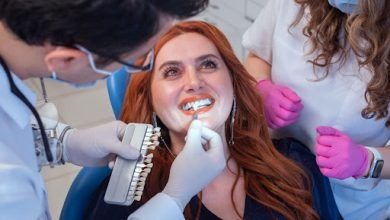Quality Sleep Linked to Teeth
Can teeth play a role in the quality of sleep a patient gets? Certain behaviors or habits of patients during their sleep, can affect how well they are able to sleep. Inadequate quality sleep is well-documented for its detrimental effect on health and well-being. In order to perform at one’s best, whether this is with sharpness of mind or physical strength, a patient needs to be well rested, rest which can best come from sleep. Sleep provides an ideal time for the body, (physically and mentally) to recuperate from the rigours of the day.
It is recommended that an individual gets a minimum of seven hours of sleep a night. A person receiving anything less than this seven-hour period could see negative consequences having an impact on their long-term health.
Dental behaviours that impact on sleep
A number of dental habits during sleep have been identified as reducing the ability of a person to sleep well at night. Some of these behaviours include:
- Grinding teeth during sleep
- Tongue and cheek biting
- Snoring
- Dry mouth (upon waking up)
- Wonky teeth
- Inflamed palate.
The above signs or habits are linked to a syndrome referred to as upper airway resistance syndrome (UARS). While UARS is not widely recognised as a medical condition, many patients have experienced its symptoms and their effects. If a patient has been waking up feeling anything but refreshed and suspect they have been exhibiting symptoms associated with UARS, it is advised to schedule a consultation with an experienced dentist at a dental clinic in W1.
Keys to sleeping better
The better able your body is to receive oxygen, the better the quality of sleep it will receive. Problems with breathing initiated by habits such as parafunctional habits – teeth grinding – present challenges to the delivery of oxygen to the brain with the consequence that sleep is disturbed. It may come as a surprise to some patients, but the cause of teeth grinding is a result of the brain struggling for oxygen. Even wonky teeth may be a sign that a person’s airways have not developed properly.
Breathing correctly during sleep encourages the control of deep autonomic rest cycles. It is during these essential deep levels of sleep (quality sleep) that the neural cells in the brain are allowed to relax and ‘detox’ (get rid of the by-products of metabolism).
Simple techniques that can be employed to sleep more soundly include looking after dental health, by making dietary changes (reducing sugar consumption and inflammatory-promoting foods). Techniques such as the following are also particularly useful:
- Breathing through the nose exercises
- Increase vitamin D levels
- Tongue exercises that are aimed at opening up the airways
- Using diaphragmatic voice exercises to improve breathing and opening up the airways.
For more information on how a dentist can help improve sleep quality, schedule a consultation at a Harley Street dental clinic. The condition of a person’s mouth can provide critical information about the health of the overall body. One’s diet, together with quality sleep and digestive health, can play a positive role in the proper functioning of the body.




